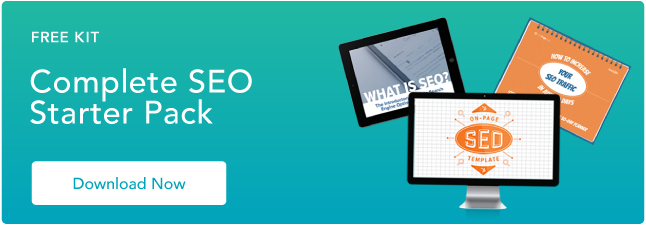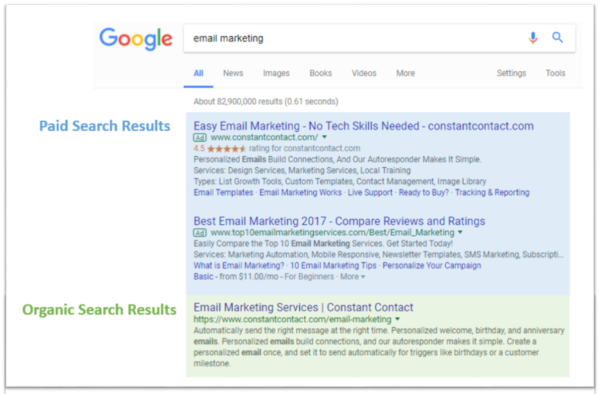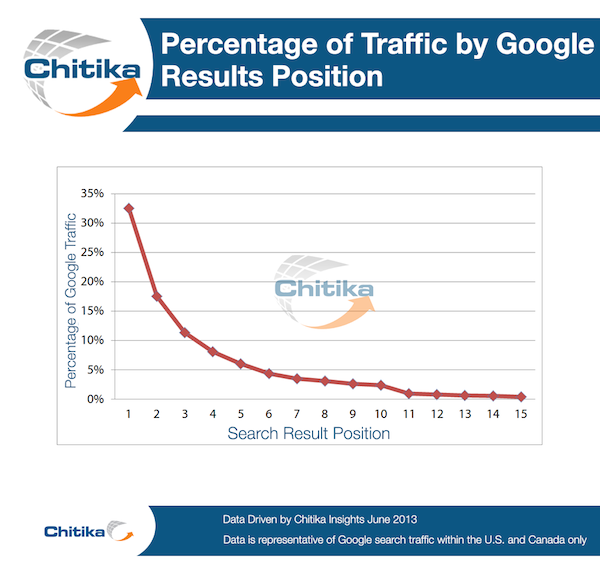As an affiliate marketer, you probably spend a LOT of time thinking of ways to drive traffic to your site.
After all, no traffic = no affiliate sales.
The two main sources of traffic for most websites are usually:
1. Organic Search
2. Paid Advertising
Social media and other sources will also bring visitors to your site, but these are usually your two best bets for consistent, ongoing traffic.
Why Should You Care About Organic Search?
Of these two main sources of traffic, search always comes out on top. In fact, a recent study by Experian Marketing Services found that on average, 87% of a website’s traffic comes from organic sources. This percentage of course, varies by industry. However it doesn’t change the fact that the majority of traffic in almost every industry comes from people typing their queries into Google or another search engine and clicking on the links in the results.
This means if your website is not optimized for search, you are potentially losing out on large amounts of traffic.
But what do I mean by "optimized for search"? I mean, your website should be created and maintained according to several widely accepted best practices for search engine optimization. You should also implement your other marketing efforts (especially content marketing and social media marketing) keeping your SEO goals in mind.
Why Should You Learn SEO?
OK, so we know SEO is important. But, there are thousands of SEO experts in the world. Wouldn’t it just be easier to hire someone to do your SEO instead of trying to understand it all?
Yes, of course. I definitely think it’s a good idea to hire someone with SEO expertise to help you out. However, if you develop an understanding of how search engine optimization works, your affiliate marketing efforts will ultimately benefit from it. In fact, by understanding what your SEO provider does, you may be able to get more out of the services they provide.
But if you're still not convinced the additional SEO knowledge will do you any good, here are 11 reasons why every affiliate marketer should learn SEO.
(By the way, our free lesson, Introduction to Affiliate Marketing SEO, is a great place to get started with your SEO learning.)
1. Understand Search Engines
You get that search traffic is important, but do you understand what it takes for your website to do well on a search engine? How do Google, Bing and Yahoo even work?
.png?10012&1444171000)
When you learn SEO, you don't just learn a new marketing skill. You actually start to understand how search engines work. This is hugely useful when you're in the business of driving traffic to your site.
Search engines consistently crawl the web for new content (links) and index them so when a person performs an online search, Google/Bing/Yahoo can deliver the most relevant results for their search query. The results are ranked so the most popular link for a search term (or the one most likely to give an answer) appears at the top (number 1 position).
But how does a search engine determine the most popular and relevant site for a search term?
Well, we don't actually know. Search engines rely on secret algorithms to decide what pages to show. SEO experts make educated guesses about what goes into those algorithms based on common factors in high-ranking websites. And Google occasionally drops little hints about what's important, too. These have led to best practices and general guidelines for SEO that make it possible for website owners like yourself to build sites specifically to get found by the search engines.
I recommend checking out Google's website on How Search Works to get a deeper understanding of what really goes on behind the scenes of the number one search engine.
If you're interested in learning more about best-practice recommendations for ranking on the major search engines, check these out:
By developing a more thorough understanding of search engines and terms like crawling and indexing, page rank and more, you will become more aware of what it takes to optimize your website and benefit from increased search traffic.
2. Improve Your Website's Design
Once you begin to understand how search engines work, you will see that a good website is not just about a pretty design and some clever content. While the focus of modern SEO is to make websites human-friendly, it's important to remember that how you and I see a website is different from how search engines view it.
For your website to be truly search engine friendly, it must follow some pretty technical specifications for design and development.
Learning SEO will help you grasp the importance of aspects of website creation, such as:
- Creating quality content.
- Making your content indexable.
- Organizing your website into a proper structure.
- The proper use of keywords in your site content.
- Having quality inbound and outbound links for your website
Here's some advice from Google on how to create a Google-friendly site.
An understanding of SEO will ensure you don't waste your time making website changes that don't deliver results. Plus, for any new websites you launch, you will also know how to structure your site and optimize it right from the start.
3. Optimize Your Content
You don't need me to tell you this, but... content is king.
On your site, on your blog, on social media... everywhere you look, the web is overflowing with millions of pieces of content.
But, how much of it is actually good quality?
In the early days of the web, it took very little to get your website to do well on a search engine. In 2015, that has completely changed. The major search engines are heavily focused on the quality of your website now, and your content has a lot to do with it.
Quality content is not just about creating a great blog post or a fun infographic. It's about building an entire website that delivers that same quality. For search engines, good content is a sign of a site that is considerate of its visitors; one that tries to anticipate and answer questions. It's all about a good user experience.
.png?10012&1444172278) Check out this really helpful e-book by SEO.com on 11 Types of Content You Should Be Creating For SEO Right Now.
Check out this really helpful e-book by SEO.com on 11 Types of Content You Should Be Creating For SEO Right Now.
Here are some guidelines from the major search engines on how to create quality content for your site:
If you're hiring people to do your content, it's important that they create something that won't get you penalized by search engines. When you learn SEO, you also learn what makes for good content so you can guide your writers, designers, bloggers and other content creators in the right direction. Or, if you're doing it all yourself, you'll know how to produce content that will impress your site visitors and search engines.
4. Figure Out What to Do with Keywords
Most people, even if they don't quite get SEO, understand that keywords play a big role in the world of search engines. This is true.
Keywords are fundamental to the search process. It's how users communicate what they're searching for. The search engines deliver results based on these keywords.
Search engines measure how keywords are used within your website. This helps them determine how relevant your website is for particular search queries. So, it's essential that you use specific, highly relevant keywords to maximize your opportunities for appearing in search results.
But, be careful of keyword abuse. In the early days of the web, stuffing as many keywords as possible onto a page was a common practice. This no longer works and in fact, will count as keyword abuse and will probably get you penalized. Now, it's more important to use your keywords in a relevant, natural way.

Don't be this person! Write naturally so your visitors feel you're having a real conversation.
Understanding how keywords work will be very helpful for you because:
- You can identify which keywords are relevant for you.
- When you do keyword research, you now know what to look for.
- If you hire a writer for your web content, you can guide them on proper keyword usage.
- You will understand where keywords need to be used, e.g., on page content, in title tags, in meta descriptions, etc.
5. Understand How Link-Building Works
Links are another big part of the SEO puzzle.
Search engines use links to analyze a website's popularity, trustworthiness, authority, and much more. However, not all links are made equal. A trustworthy site is likely to link to another trustworthy site — not to spammy sites. This often helps a search engine determine the quality of links.
The more popular and trustworthy a site, the more significant it is to have a link from them.
So, to make the most of your link-building efforts, you need to make sure you're acquiring links from other relevant, popular and trustworthy sites. These will be helpful for your website's SEO. Paying for 1,000 irrelevant links will do you no good.

Link-building is an important task for SEO. Whether you're doing your own link building or hiring someone else to do it, you need to understand how it works to make sure you're only building quality links.
6. Build Your Online Reputation
When you learn SEO and do it right, your site will start to show up in more search results, thus boosting your brand's online visibility.
How does a boost in your visibility help you? When you start to show up in the results for all the relevant search terms for your industry, your audience and customers will start to think of you as a leader in the industry.
I'm not making this up. People trust organic search engine results more than paid ads.
On average, people believe organic results are more likely to be current and relevant. They want the most authoritative sources. In short, they believe they are getting the best information via search engine results.
So when you understand SEO, you can figure out how to optimize your site to appear in the results for more queries that are relevant for your customers. The more they see you, the more they will start to trust your site.
7. Get More Traffic to Your Website
A website optimized for search engines is definitely going to start getting you more traffic.
An eConsultancy study found that an overwhelming 94% of clicks are for organic search results.
Another experiment also found that 60% of "direct traffic" reported in your data may actually be attributed to organic search.
With people more likely to click on search results than paid ads, it's only natural that if your website is more visible online, you will start to see more people visiting your site.
Search engines are the first point of contact for most people looking for information. SEO helps you understand how to make your site more visible to the right audience, which in turn results in more traffic to your site.
8. Make More Money
 Say your website currently gets a 100 visitors a day. Let's also say that 2% of your visitors click through to your ads and this makes you $2 a day.
Say your website currently gets a 100 visitors a day. Let's also say that 2% of your visitors click through to your ads and this makes you $2 a day.
Now, your website is getting a 1,000 visitors a day thanks to solid SEO. You have the same 2% click-through rate. This means you're now making $20 a day!
If you experience a jump in traffic thanks to your SEO efforts, this is eventually going to boil down to increased revenue from your website — especially if your website is optimized to make your traffic convert to sales. Who doesn't like more money?
But to make this extra money, you really have to develop an understanding of what SEO is, how it works and how you can make it work for you.
9. Market Yourself for Free
SEO is free marketing.
Pay-per-click advertising requires you to set daily/monthly budgets that you are willing to spend to buy advertising space on search engines. Each click on an ad will cost you money, and if you're in a particularly competitive industry, clicks can sometimes cost $40-50!

Clicks on organic results don't cost you any money. All you have to do is maintain your position in the rankings, and the traffic you get is completely free.
Of course, you will be spending time and energy optimizing your site in the first place. It's going to cost you some hours, even if it costs you no money. You can also hire someone else to do the initial work, which will put a dent in your budget. But then you can save money by doing your ongoing SEO maintenance yourself — because you'll understand how SEO works!
10. Protect Yourself From Sketchy SEO Practices
If you're working with an SEO expert, it's doubly important to at least have an idea of what they're going to do for your site.

There are thousands of SEO providers out there, and while a lot of them are very good, some will engage in sketchy practices. Their aim is to show you results right away, but there's a few problems with that:
- These results will be short term.
- Your site could end up with a penalty.
- Google could de-index you for spammy SEO practices.
By learning a bit about search engine optimization, you'll learn the difference between what is good (white hat SEO) and what is bad (black hat SEO). Avoid black hat tactics, and if your SEO provider tries to suggest anything sketchy that falls into this category, you know to send them packing straightaway. SEO takes time, so don't be frustrated if you don't jump in the search rankings overnight!
11. Become a Better Affiliate Marketer
Your end goal is not to become better at SEO, but to become better at affiliate marketing...right?
By gaining an understanding of SEO, you will:
- Make better, more SEO-friendly websites, right from the beginning.
- Get better at driving traffic to your website.
- Create better, more relevant content for your site.
- Build high quality links to your site.
- Improve your website's authority in the industry.
- Outdo the competition (especially if they're not doing SEO).
- Spot more opportunities for growing your site and business.
Nobody knows your business better than you, and SEO will only help to enhance that.
Does this make you want to learn SEO to improve your affiliate marketing efforts?
If you already do SEO for yourself, what do you think has been the number one benefit of learning SEO for affiliate marketing?
P.S. If you're looking for a tool that shows you whether your SEO efforts are getting you anywhere, we have something for you: AffiloTools automatically tracks your rankings in great detail and in multiple search engines so you can see real results.









